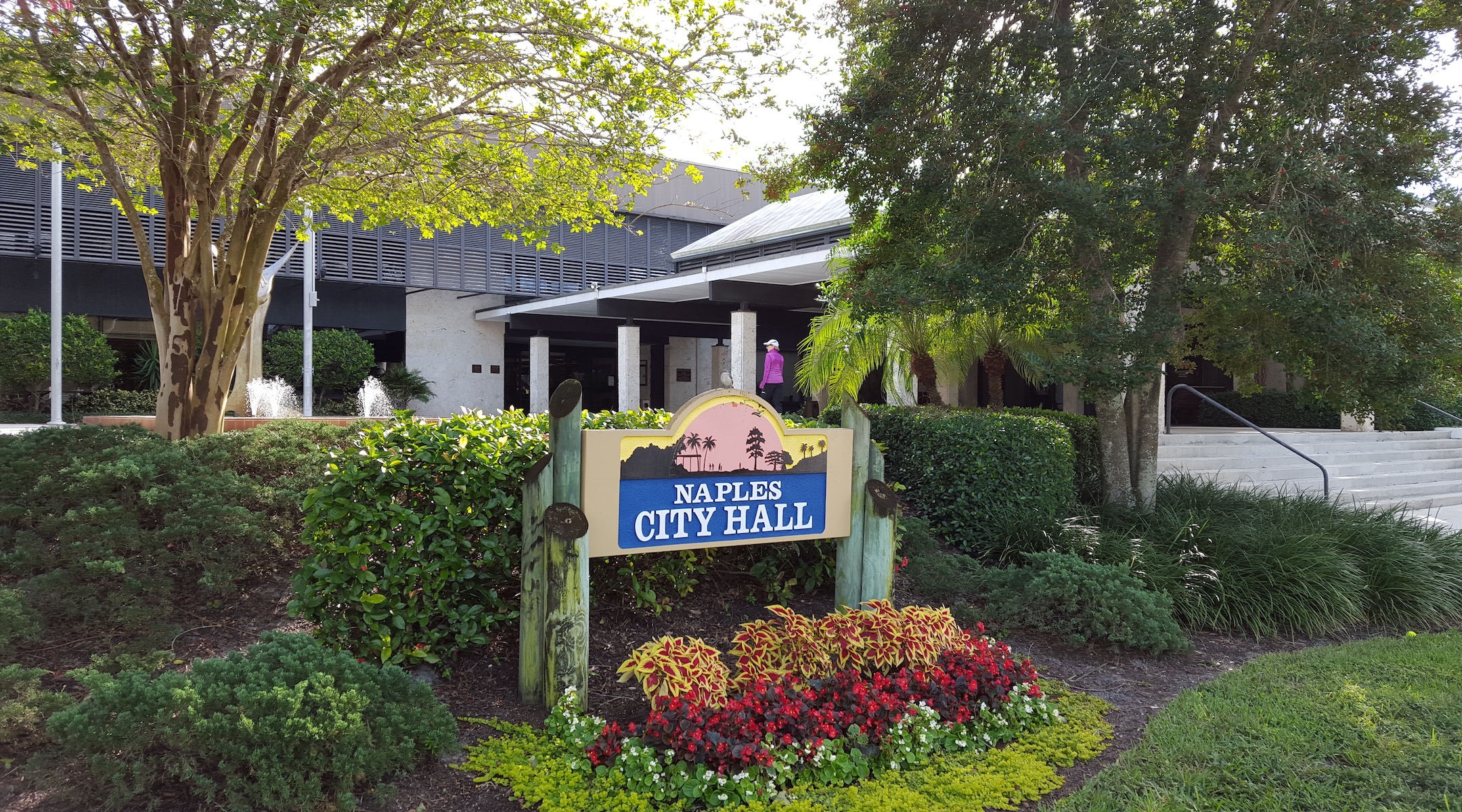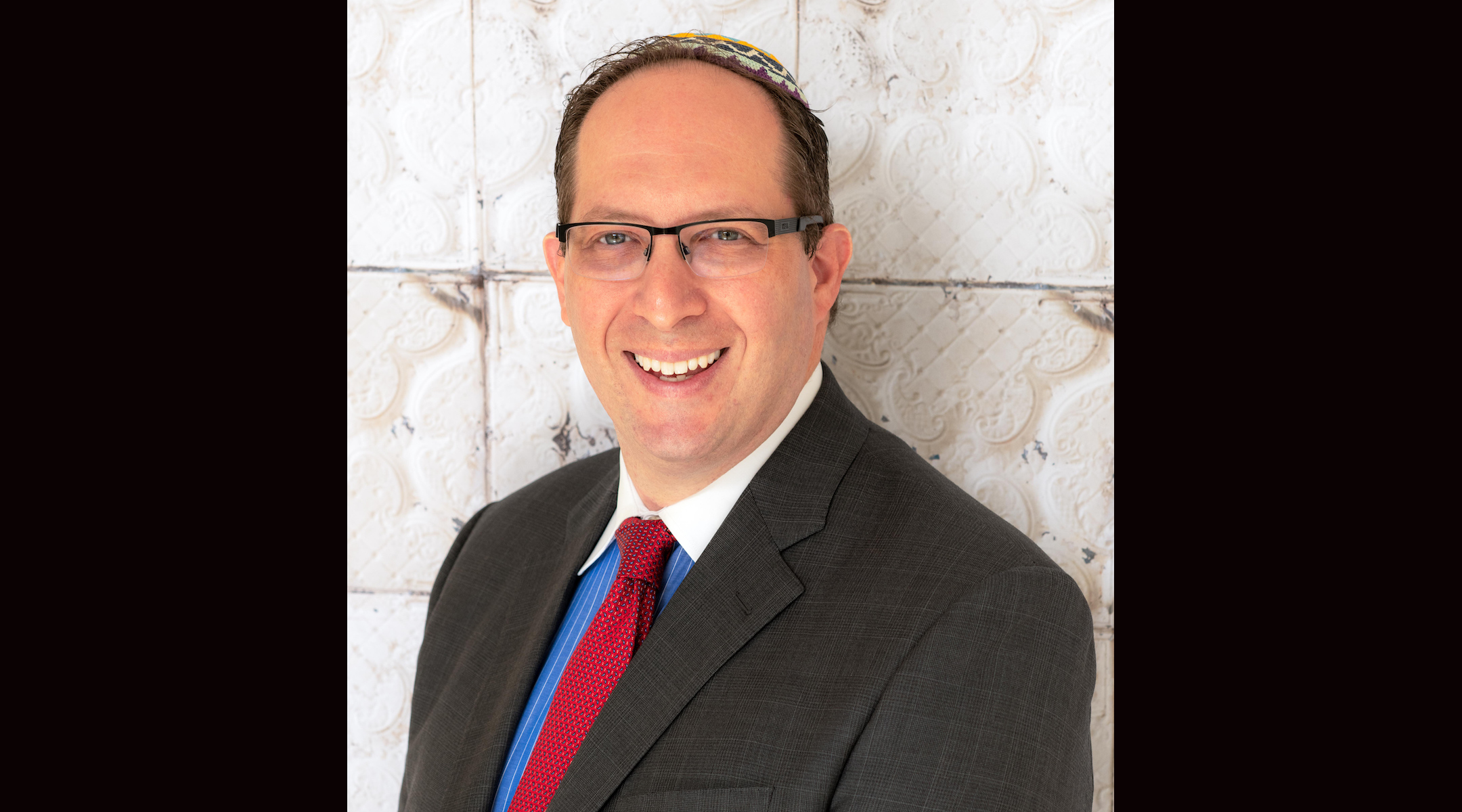‘You’re on the path to sin’: A Florida rabbi faced antisemitic harassment after speaking up at a school board vote
A superintendent vote in Naples, Florida, unearthed simmering tensions between the school board, its supporters, and local Jews

The city hall in Naples, Fla., is seen on Jan. 20, 2016. (Whoisjohngalt via Wikimedia Commons)
(JTA) — Rabbi Adam Miller was exiting a school board meeting in his city of Naples, Florida, when two men approached him in the parking lot.
“Your prophet is not real, and Judaism is not a real religion,” they yelled at him, according to the subsequent police report. The rabbi recounted other colorful epithets, too: “Judaism is wrong.” “You’re on the path to sin.”
The encounter startled Miller, the senior rabbi of Temple Shalom since 2010. He knew that local students had experienced antisemitism at school and was aware that his city had a checkered past when it came to including Jews — but he had never before been accosted in this way.
“I was still wearing my kippah. I was clearly identified as the rabbi,” he told the Jewish Telegraphic Agency about the incident, which took place in early May. “Their tone was very hateful and angry, and they would not stop following me.”
Miller returned to the building to wait the men out. But he was shaken: They had been wearing badges supporting a viable candidate for district superintendent who was standing for election that evening — a man who had, during an interview for the position, argued that “unchurched, uncultured Americans” were a cause of the country’s “moral decline.”
Miller had come to the meeting that night because he was concerned about that candidate, Charles Van Zant, Jr., and felt the need to speak out against him. Van Zant is a military veteran who had been the superintendent of another district for four years until he was voted out in 2016. In his application for the post in Naples, he had said he was “encouraged to see traditional and conservative values returning to Florida Schools,” and during the meeting, his supporters echoed that ambition.
“We need to teach them Christian moral values,” one Van Zant supporter said during his public comment period, referring to schoolchildren. “I know that’s not a popular opinion.”
Van Zant would narrowly fall short in his bid to lead the district, losing out by a single board member’s vote. Yet the fact that he nearly won left local Jews rattled. That close result, coupled with the harassment of Miller, offered a stark illustration of how a rising tide of conservative activism in Florida politics — and surrounding local school boards across the country — can stoke antisemitism or otherwise come at the cost of Jews.
Reflecting on that night, Miller said he feared his city was falling prey to “this bigger culture that’s been allowed to exist, of hate towards the other, of letting fear of things that we don’t know or don’t understand drive us to be hateful.”
“I’ve really come to believe that silence is oxygen for hate,” he said. “Not speaking out, not saying something, is just letting it get bigger and more out of control.”
The dynamic present in Naples, a city of about 20,000 on the Gulf Coast, has been pronounced across Florida, where Republican lawmakers have empowered the activism of conservative parents. Recently the state rejected Holocaust education textbooks in part because they contained “social justice” themes, and districts in the state have, on parents’ request, removed books about Anne Frank, queer Jewish families and other topics related to Jews and the Holocaust.
“I think many of the people that were in that room would see themselves as good Christians,” said Jeffrey Feld, executive director of the local Jewish federation, who likewise came to the school board meeting to protest Van Zant. “On the other hand, there are certain groups they don’t want to be inclusive of. They clearly do not want to include, for instance, the LGBTQ community. There were different statements that were made that way.”
Feld added, “So yes, I think it is a great concern for all of us to have to deal with. And it’s something that we look at every single day.”

Local Jews say Naples has a history of antisemitism, and trouble started brewing at the Collier County school board during its election last year. Three of the five seats were up for grabs, and all went to conservatives. Two of those new board members seemed to hold, or associate with people who held, antisemitic views.
One, Jerry Rutherford, identifies as a Christian but attends a Messianic congregation — part of a movement that calls itself Jewish but believes in the divinity of Jesus and often has ties with Christian organizations. Messianic Judaism is roundly considered non-Jewish by actual Jewish groups, and its emphasis on proselytizing to Jews is seen as antisemitic.
Rutherford is a former chairman of the local Christian Coalition and founder of a group that distributes free Christian Bibles to high school students, which he says is “in honor of Religious Freedom Day.” He told JTA he’s a proponent of school prayer and an increased focus on religion in the classroom, including putting replicas of the Ten Commandments in schools — measures many Jewish groups have long opposed.
Rutherford was the board member who prompted Van Zant’s “unchurched” comment, by asking him during the candidate interview process in April to diagnose “the reason for the moral decline in our country and in our schools.”
Another new school board member, Tim Moshier, was elected after one of his campaign volunteers was revealed to have posted antisemitic videos to social media — including TikTok videos about Jews “using pornography as mind control” — and who also declared herself an antisemite on the platform, according to an article in the Naples Daily News. The volunteer also maintained an active account on Gab, a social network for far-right extremists, which she frequently used to post antisemitic messages about Jews and Israel.
Confronted with the videos by a reporter for the Naples Daily News, Moshier initially said he didn’t have a problem with them and did not condemn antisemitism. (According to the article, his campaign’s official Instagram account had responded to a message from a Jewish TikTok user by stating, “We recommend that you do some research into the topic as she is not wrong and we will not be reconsidering her position for anyone else.”) Days later, Moshier did condemn both the videos and antisemitism “in the strongest terms,” saying he was not aware of the volunteer’s social media history.
The makeup of the new school board alarmed Feld, the Jewish federation executive who has been in his position for nearly a decade. He remains haunted by an antisemitic event that took place years before he even arrived in Naples: a “Kick a Jew Day” that local public school students had staged in 2009.
The stunt resulted in the suspension of several students as well as critical news coverage from around the world. As part of its response, the federation launched a “Stand Up For Justice Committee” that gives out annual awards to people fighting hate in the local community. Recipients have frequently included teachers and other employees of the local school district; four Collier County teachers were awarded the prize this year.
But Feld said it’s unclear whether the federation’s awards and other anti-hate efforts had changed the culture in local schools. He and Miller both said Jewish students had recently experienced incidents of antisemitic bullying at school. One reported a classmate who had showed up to school dressed as Adolf Hitler; another student superimposed a Jewish student’s face onto a concentration camp uniform and sent the image to their entire class.
Miller declined to share photographs of the alleged incidents, saying the students had asked not to share any further information about what had happened. Asked about the allegations, a spokesperson for the school district said that federal law prevents them from commenting on student discipline matters.
Feld said the recent manifestations of antisemitism are continuing a long local tradition of anti-Jewish bigotry. Jews who came to Naples up until recent decades, he said, “very definitely got the impression that it was not a friendly community to the Jewish community.” Today the Jewish Federation of Collier County serves around 10,000 Jews, and the area has Conservative, Reform and Chabad congregations — though its Jewish infrastructure is far less robust than that of the Miami area, about 100 miles due east.
At the recent school board meeting he attended with Miller, Feld identified himself to the board as the Jewish federation president and made the case for Van Zant’s opponent as the better option for the Jewish community, saying she held the values of “sensitivity, civility, respect and inclusivity.” Those values were particularly important, he said, in light of the harmful legacy of “Kick a Jew Day.”
“That day spoke to antisemitism and hate,” Feld said. “In our community, antisemitism continues to grow. Hate continues to grow.”
Ultimately, Van Zant lost his election for superintendent 3-2 to the Jewish community’s preferred candidate, a longtime district administrator widely liked by her peers. Van Zant’s two votes came from Rutherford and Moshier.
Reflecting on the vote and its aftermath, Rutherford said the news of what had happened to the rabbi “saddens me, because I attend a Messianic Jewish synagogue. And actually, I blow the shofar at the synagogue.”
At the same time, he did not think that Van Zant’s comment about “unchurched” Americans indicated a threat to Jews. “I think he understands our background, as far as our Biblical background,” Rutherford told JTA. “He would not be opposed to anything Jewish.”
Rutherford seemed surprised to hear that his plan to distribute Bibles to students could be hostile to Jews.
“Well, what if we just gave out the Torah itself? Would that be satisfactory?” he said. Rutherford added he had not yet spoken to members of the local Jewish community about these matters but that he would reach out to the federation to have a conversation. (Weeks after this interview, Feld told JTA he had yet to hear from Rutherford.)
Moshier did not respond to multiple JTA requests for comment, both directed to him and to a spokesperson for the school board. But he does have at least one defender — Rutherford, who said that he did not believe Moshier was antisemitic, “because his wife is Jewish.”
Moshier’s campaign manager, Rutherford said, has “a free right to speak their mind. But that doesn’t mean [Moshier is] in agreement with it.”
A spokesperson for the Collier County school district declined to comment on the harassment of Miller, saying that the district does not comment on interactions between private citizens, adding that the district has a “zero tolerance” policy for “discriminatory and harassing misconduct by staff.”
In addressing the incident, Miller hopes law enforcement might be able to make use of a new law combating “ethnic intimidation” that was recently signed by Florida Governor Ron DeSantis, which makes it a felony to spread antisemitic messages on private property. But other police departments in the state have so far failed to make use of the new statute, and a JTA public records request for the police incident report showed that as of about a month after the altercation, no charges have been filed.
But Miller doesn’t want to focus on what happened to him. His primary worry, he said, is about the increasingly uncertain environment that Naples’ Jewish community seems to find itself in.
“There’s been a rising concern,” he said. “We keep seeing these things, and nothing’s really being addressed.”
This article originally appeared on JTA.org.





















